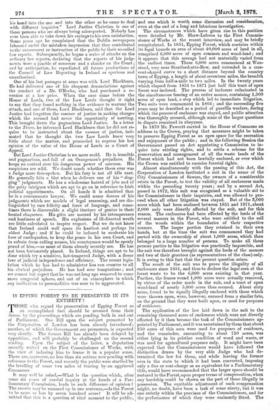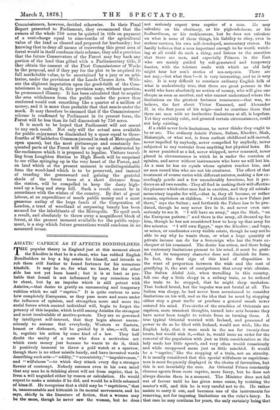IS EPPING FOREST TO BE PRESERVED IN ITS ENTIRETY ?
THOSE who regard the preservation of Epping Forest as an accomplished fact should be aroused from their dream by the proceedings which are pending both in and out of Parliament. One Bill upon the subject promoted by the Corporation of London has been already introduced ; another, of which the Government are promoters, is expected very shortly. The former Bill has already been delayed by opposition, and will probably be challenged on the second reading. Upon the subject of the latter, a deputation recently waited on the First Commissioner of Works, with the view of inducing him to frame it in a popular sense. There are, moreover, no less than six actions now pending with reference to the Forest, and recently the public were startled by the levelling of some two miles of. fencing by-an aggrieved Commoner.
It may well be asked,—What is the question which, after some six years of careful inquiry at the hands of a Par- liamentary Commission, leads to such difference of opinion ? The answer may be summed up in one sentence,—Is the Forest to be more or less by seven hundred acres? It will be ad- mitted that this is a question of vital moment to the public, and one which is worth some discussion and consideration, even at the end of a long and laborious investigation.
The circumstances which have given rise to this position were detailed by Mr. Shaw-Lefevre to the First Commis- sioner of Works at the recent interview, and may be briefly recapitulated. In 1851, Epping Forest, which contains within its legal beunds an area of about 40,000 acres of land in all, comprised 6,000 acres of open common and wood-land ; and it appears that this acreage had not materially varied from the earliest times. These 6,000 acres commenced at Wan- stead, very near Stratford-atte-Bow, and extended in a cres- cent-shaped curve to a short distance beyond the country town of Epping, a length of about seventeen miles, the breadth varying from half-a-mile to two miles. In the twenty years which elapsed from 1851 to 1871 just half this tract of open forest was inclosed. The process of inclosure culminated in the simultaneous fencing of an entire manor, containing 1,300 acres of open land, a step which led to immediate litigation. Two suits were commenced in 1866; and the succeeding five years may be described as a period of guerilla warfare, during which the process of enclosure was stayed, and public attention was thoroughly aroused, although some of the larger questions in dispute remained in abeyance. In 1870 Mr. Fawcett carried in the House of Commons an address to the Crown, praying that measures might be taken to preserve Epping Forest as an open space for the recreation and enjoyment of the public ; and in the following Session the Government passed an Act appointing a Commission to in- quire into existing rights, and to settle a scheme for the preservation and management of all the waste lands of the Forest which had not been lawfully enclosed, or over which the Crown was entitled to exercise forestal rights.
Almost simultaneously with the passing of this Act, the Corporation of London instituted a suit in the name of the City Commissioners of Sewers, the owners of a considerable estate in the Forest, to test the validity of all enclosures made within the preceding twenty years ; and by a second Act, passed in 1872, this suit was recognised as a valuable aid to the Commissioners in their inquiries, and was allowed to pro- ceed when all other litigation was stayed. But of the 3,000 acres which had been enclosed between 1851 and 1871, about 2,000 only were directly affected by the suit, and for this reason. The enclosures had been effected by the lords of the several manors in the Forest, who were entitled to the soil of the woods within the boundaries of their respective manors. The larger portion they retained in their own hands, but at the time the suit was commenced they had parted with the ownership of about 1,000 acres, which then belonged to a large number of persons. To make all these persons parties to the litigation was practically impossible, and the suit was therefore brought against the lords of the manors and two of their grantees (as representatives of the class) only. It is owing to this fact that the present question arises.
The result of the suit was to prove the illegality of all enclosures since 1851, and thus to declare the legal area of the forest waste to be the 6,000 acres existing in that year.
Further, the fences round 1,900 acres were actually removed, by virtue of the order made in the suit, and a tract of open wood-land of nearly 5,000 acres thus secured. About sixty acres, found to be equally illegally enclosed with those which were thrown open, were, however, excused from a similar fate, on the ground that they were built upon, or used for purposes of residence.
The application of the law laid down in the suit to the remaining thousand acres of enclosures which were not directly affected by it then became the task of the Commissioners ap- pointed by Parliament, and it was ascertained by them that about 250 acres of this area were used for purposes of residence, and the remainder, amounting to about 750 acres, was either lying in its pristine condition of wood and waste, or was used for agricultural purposes only. It might have been expected that the Commissioners would have followed the distinction drawn by the very able Judge who had de- termined the law for them, and while leaving the former area in the state to which it had been converted, imposing only a fine or rent-charge as an equivalent for a Parliamentary title, would have recommended that the larger space should be restored to the Forest, upon proper terms of compensation, when any hardship could be shown on the part of those illegally in possession. The equitable adjustment of such compensation might, no doubt, have been a task of some nicety, but it was one strictly within the province of the Commissioners, and for the performance of which they were eminently fitted. The Commissioners, however, decided otherwise. In their Final Report presented to Parliament, they recommend that the owners of the whole 750 acres be quieted in title on payment of a rent-charge equal to nine-tenths of the agricultural value of the land as cleared and prepared for husbandry; but knowing that to deny all means of recovering this great area of forest would in itself condemn their scheme, they add a provision that the future Conservators of the Forest may buy back any portion of the land thus gifted with a Parliamentary title, if they obtain the consent of the First Commissioner of Works to the proposal, and if they pay for the plot to be acquired its full marketable value, to be ascertained by a jury or an arbi- trator, under the provisions of the Lands Clauses Acts. With- out the slightest imputation upon the good-faith of the Com- missioners in making it, this provision may, without question, be pronounced illusory. It has been calculated that to acquire the area withdrawn from the public under the power thus conferred would cost something like a quarter of a million of money, and it is more than probable that that sum is under the mark. -It may therefore be assumed that if the Commissioners' scheme is confirmed by Parliament in its present form, the Forest will be less than its full dimension's by 750 acres.
It is much to be hoped that Parliament will not assent to any such result. Not only will the actual area available for pubis enjoyment be diminished by a space equal to three- fourths of Wimbledon Common (second in rank of Metropolitan open spaces), but the most picturesque and constantly fre- quented parts of the Forest will be cut up and obstructed by the enclosures which it is proposed to legalise. Visitors travel- ling from Loughton Station to High Beech will be surprised to see villas springing up in the very heart of the Forest, and on land which at the present moment is undistinguishable from the wood-land which is to be preserved, and instead of treading the greensward and gaining the grateful shade of the forest trees at a short distance from the station, will be compelled to keep the dusty high- road up a long and steep hill. Such a result cannot be in accordance with the wishes of the country. By dint of great labour, at an expenditure of much public money and a most generous outlay of the large funds of the Corporation of London, a tract of woodland of surpassing beauty has been secured for the inhabitants of the Metropolis. To spoil such a result, and absolutely to throw away a magnificent block of forest, at the present moment available for the public enjoy- ment, is a step which future generations would condemn in no measured terms.



































 Previous page
Previous page